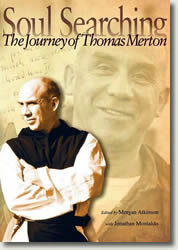A PBS Requiem for Thomas Merton
Wednesday, December 10, marks the 40th anniversary of a sad event: Thomas Merton’s accidental death by electrocution in Bangkok, Thailand. Many fans and readers felt that so much of Merton’s work was left unfinished. In his final years he had become increasingly interested in interreligious dialogue (particularly between Buddhist and Christian monks, hence the Thailand trip), as well as the nuclear arms race and global peacemaking. Forty years later, much of our own work on those issues remains distressingly fragmentary, leaving us to wonder what the world might have been if Merton had lived past his early fifties.
We’ll never know the answer to that question, but we do get some fine insights into his life and work in the new documentary Soul Searching: The Journey of Thomas Merton, airing nationally on PBS on Saturday, December 14. (Check your local listings for times.) Most people know of Thomas Merton through his best-selling autobiography, The Seven Storey Mountain, in which he chronicled his extreme conversion from a life of secular dissolution to that of a Trappist monk. Unfortunately, that memoir, published sixty years ago at the onset of “the Catholic moment” in American history, only details Merton’s life up through his monastic vocation.
Like all great thinkers, Merton couldn’t be frozen in time, and his thoughts near the end of his life were sometimes quite different than the ones immortalized in the famous memoir he wrote in his early thirties. He particularly regretted the book’s more facile divisions of the world into what is pure (the monastery) and what is impure and worldly (everything and everyone else).
The documentary doesn’t skimp on Merton’s early life, but it also moves us beyond The Seven Storey Mountain to the later Merton, who was both fully monastic and fully engaged in the world, who left behind more than 10,000 pieces of correspondence and sixty books. Viewers may learn some surprising things, including the fact that Merton had a sort of affair of the heart near the end of his life with a woman who nursed him after back surgery. He was fifty-one; she was half that age; they were in love. Being together was impossible, however, and after a season, Merton reaffirmed his monastic vows. The documentary handles this matter-of-factly, without sensationalization: the romance happened, but it did not define Merton’s life.
The one-hour documentary, created by filmmaker Morgan Atkinson, was distilled from two years of research and more than sixty hours of interviews, and consequently can’t always delve into the fullest treatment of Merton’s life. (It is also sometimes less than subtle, as when it portrays the shattering of Merton’s atheistic worldview and subsequent expanded conceptualization of God by the sound of glass shattering in the background.) For a more complete treatment, Liturgical Press has created a companion volume—also called Soul Searching—which offers more extensive interviews with the talking heads on the DVD, such as Martin Marty, Paul Elie, Lawrence Cunningham, John Dear, and Bonnie Thurston.
For $39.95, readers get long excerpts from the print interviews, an introduction and some annotations by Atkinson, and a copy of the DVD tucked into the back jacket. The book is well worth the price. There are numerous black-and-white photographs, some taken by Merton himself; reminiscences by those who knew him and those who study his life and writings; and a moving afterword on what it was like to show the documentary to Gethsemani’s monks in a private screening.
Copyright © 2008 Jana Riess.
